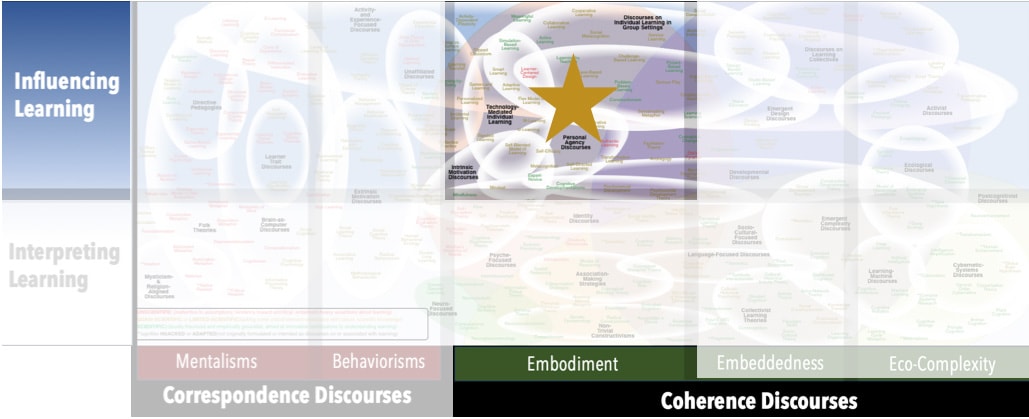Focus
personal sense-making/understanding/knowingPrincipal Metaphors
- Knowledge is … scope of possible actions and interpretations
- Knowing is … evolving webs of coherent interpretations; fitness with circumstances
- Learner is … a meaning-maker (individual)
- Learning is … construing, adapting, connecting, interpreting, weaving
- Teaching is … occasioning, prompting, triggering, listening
Originated
2000sSynopsis
Expressive Constructivism embraces Radical Constructivism’s models of learning and knowing, and it places a particular emphasis on the role of “re-presentation” – that is, varied modes of expressing one’s emerging construals – as the critical dynamic in human learning. Three categories of expression and identified, and each is coupled to a mode of evaluation: internal (thinking; makes sense to me), natural (communicative acts; others understand me), and formal (using symbols, grammars, and other formalism conventions; what I intended happens). Types of and strategies for Expressive Constructivism include:- Critical Role Monitor – taking on responsibility for attending to others’ strategies, understandings, and interactions during collaborative problem solving
- Paraphrasing Practice (Summarization Practice) – restating a new idea in one’s own words
- Self-Explanation (Think-Alouds) (Michelene T.H. Chi, 1980s) – explaining how a new idea relates to one’s established knowledge. Associated constructs include:
- Self-Explanation Effect – a reference to the educational benefits of Self-Explanation, which are reputed to be cognitive, affective, and social in nature
- Thinking Aloud – articulating one’s thought processes while solving problems. (NoteL Thinking Aloud is very similar to, but typically presented as distinct from, Think-Alouds – a.k.a. Self-Explanation, see above. They might be distinguished on the specific demand of Think-Alouds to relate current thinking to established understandings.)
- Co-Discovery Method (Constructive Interaction) – a loosely defined construct that has been applied to situations in which multiple learners work together to solve problems.
- Expressive Learning – a teaching approach through which students are invited to communicate learning through music, dance, drama, and/or other expressive arts
Commentary
Expressive Constructivism isn’t conceptually distinct from Radical Constructivism. Rather, the theory appears to consist of an amplification of a single point, on the role of expression. Consequently, it and some of its variations (e.g., Expressive Constructivism) are often taken up naively, more as means or sites of assessment than as opportunities or contexts for elaborated learning.Authors and/or Prominent Influences
Richard MillwoodStatus as a Theory of Learning
Insofar as it echoes Radical Constructivism, Expressive Constructivism can be considered a theory of learning. However, offers no significant elaboration of Radical Constructivism.Status as a Theory of Teaching
Expressive Constructivism’s amplification on a single pragmatic element of Radical Constructivism renders it more a theory of teaching.Status as a Scientific Theory
With its similarity to Radical Constructivism, it could be said that Expressive Constructivism has a significant evidence base. A substantial and robust research program has not arisen around it, however.Subdiscourses:
- Co-Discovery Method (Constructive Interaction)
- Critical Role Monitor
- Expressive Learning
- Paraphrasing Practice (Summarization)
- Self-Explanation (Think-Alouds)
- Self-Explanation Effect
- Thinking Aloud
Map Location

Please cite this article as:
Davis, B., & Francis, K. (2024). “Expressive Constructivism” in Discourses on Learning in Education. https://learningdiscourses.com.
⇦ Back to Map
⇦ Back to List
